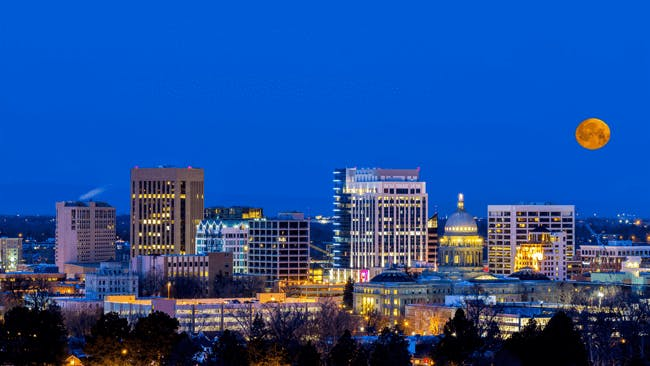
Think about everything you have heard about Idaho. Now toss those rumors right out the window. Idaho is not what it appears to be. It never has been. “Esto perpetua!” claim Idaho’s residents and founders. Let it be eternal, indeed. But what eternality does Idaho represent? Beauty? It certainly has that. Potatoes? Hey, there’s no shame in the game, Idaho. If you’ve got it, flaunt it, right? Despite rumors to the contrary, Idaho is even one of the fastest growing states in the country. Why, you ask? “Esto perpetua” of course. News is catching on about Idaho’s seemingly endless beauty. That news has also caught the attention of the more unsavory crowds of people as well. No, we don’t mean haters of potatoes. We mean criminals. Where populations rise, so do does crime. As such, home security in Idaho is a growing concern.
Home Security Provider Requirements for Idaho
In many ways, Idaho is as bucolic a state as one could hope for. But natural, country beauty ends pretty quickly at the city line. So does the safety of living in the country. Idaho is an interesting case when it comes to home security. The state does not regulate home security providers. At all. Zilch. Zip. Nada. The only state-level regulation one might find relates to the requirements for low-voltage electrician licensing.
As you may or may not already know, a home security system is considered “low-voltage”. Home security providers will install it for you, and in some states do not need to have electrician’s licenses to do so. In other states, their crews have to be licensed to do the work (makes sense, right?). The latter holds true for Idaho. The real problems arise when you start looking beyond the need for electrical work. What kind of assurances are in place to prevent overall shoddy work? Or untrustworthy business dealings? Or even workers with an active criminal past who might just be using the job as a good way to get into people’s homes more easily? With this in mind Idaho, it might be best to skip local dealers and go straight to a nationwide company that is held to the regulations enacted by other states. But there is an exception to this rule.
The largest cities in Idaho are your best bet. Take Boise, for example. This city requires alarm companies to obtain a license to do business. This includes an application that requires a criminal background check for both the business and employees that install the alarm system. This is coupled by the need to post surety bonds. For an alarm system installer, that’s a $2,500 bond. For a new company, a $10,000 Fiduciary Bond is required, with an additional $500,000 in Liability Insurance. Yikes. That’s a huge payment up front to merely enter the market. But this is true of Boise. Not so for the rest of Idaho.
If you look outside of Boise, you’re going to have a hard time finding much regulation or even legal language related to alarm systems. Few of Idaho’s cities have any information publicly available online. You might find some success if you call your local city hall. Then again, your call may be met with some answers that don’t make you happy.
There are good reasons why most cities in Idaho simply haven’t caught on to the need to put a few rules in place. For the most part, home security has not been an issue in the historically low-populated state. Boise, which is by far the largest city in Idaho, has slightly over 200,000 people. The next closest is Meridian, with only 86,000 people. A fair number of statistics related to cities base numbers out of 100,000 people. Most of Idaho’s cities don’t even land on the radar.
Still, Idaho is barely a blip on the radar with its low crime rates. The state as a whole is one of the safest in the country. This doesn’t excuse the state for ignoring a few essentials when it comes to protecting citizens from improper business practices in the home security market, however. If you’re going shopping for home security in Idaho, it’s best to fry a few potatoes and then do your research first. With so few rules in place, playing a guessing game might not be in your best interest.
Idaho Rules On Home Security Cameras
There’s more than one way to cook a potato. If that “potato” is a criminal, there’s more than one way to catch them in the act of doing their dirty deeds. Home security cameras are one good way to do just that. Idaho’s lax laws related to home security providers spill right on over into their laws for home security cameras. Which is to say, there isn’t much to speak of.
Idaho’s home surveillance laws that do exist are about as common sense as it gets. Idaho has a very clear video voyeurism law that says, no, you can’t go around recording anyone in secret for your own pleasure. Should you decide to put up security cameras, you’ll need to make sure those cameras are not “sketchy” locations where you’ll catch people in compromising positions. And we’re not talking about “breaking into your house” compromising. It probably doesn’t need to be reiterated too much, but we’ll say it anyway: don’t do it. Video voyeurism is a huge no-no. And by that we mean felonious.
If you’re an upstanding citizen (and we know you are), then you’re in luck. Placing video cameras around your home for security reasons are a good thing in Idaho. And while Idaho is a one-party consent state for audio, it’s still best to avoid including audio on your cameras. The last thing you want is to accidentally record a conversation you had no right to hear, even if it was by accident.
With all things security, it’s best to err on the side of caution. For added safety, and because Idaho’s laws are more localized than centralized, it’s best to call your local government for any specifics. Different towns and cities have their own standards, which are prone to change without much notice from the population.
Safety During Natural Disasters
Here’s your geography test: Where is Idaho located? If you couldn’t say “American Northwest” in under 5 seconds, you might need to go watch a few episodes of Are You Smarter Than a 5th Grader? Idaho’s location affords it a few advantages when it comes to natural disasters, while opening it up to other potential issues. The Idaho Bureau of Homeland Security lists all of the following as potential natural disasters in the state: floods, storms, wildland fires, landslides, avalanches, droughts, lightning, and earthquakes.
Let’s be realistic about that, however. As a state, Idaho is extremely low-risk for natural disasters. The American Northwest, as a whole, is the safest area in the country for natural disasters of all types. Idaho is no exception. If anything, your biggest concerns will be flooding in some of the low-lying areas, as well as mudslides and harsh winter weather. The latter will likely be the more common issue.
Winters can indeed get harsh in Idaho. The state is very mountainous, and far enough north that it can experience severely cold weather. Still, the average temperature in the state only dips down to around 25 degrees in the winter, with an average yearly snowfall of 29 inches. It’s best to take winter seriously in Idaho by preparing the right way. This includes making sure you have spare food and water, extra wood for fireplaces (or gas for gas fireplaces), and lots of batteries. Should you get stuck in a blizzard, be prepared for the long haul. Many of Idaho’s cities are fairly rural, with long commutes to the nearest town.
Idaho is an excellent place to live, as evidenced by the state’s fast-growing population. The state has never had a “wild, wild West” reputation. However, if you consider the state of its regulations regarding home security, it can certainly feel that way. If you’re looking into home security in Idaho, do you research, contact your local government, and be vigilant. Even in a state as nice as Idaho, there are sharks out there. And we can guarantee you that they don’t work for potatoes.

